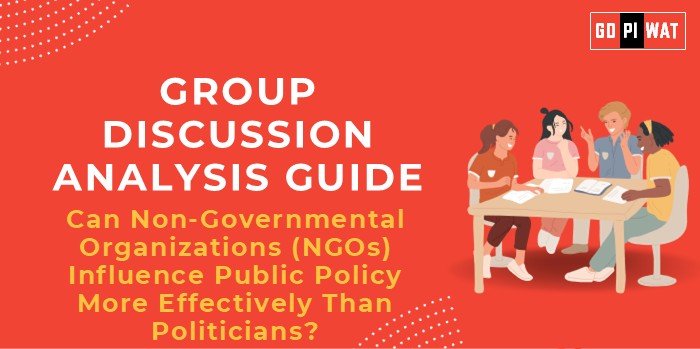📋 Group Discussion (GD) Analysis Guide
🤔 Can Non-Governmental Organizations (NGOs) Influence Public Policy More Effectively Than Politicians?
🌟 Introduction to the Topic
Opening Context: Non-governmental organizations (NGOs) address critical issues like poverty, education, and human rights, complementing or challenging government efforts. Their growing influence on public policy raises questions about whether they can drive change more effectively than elected politicians.
Topic Background: Operating independently of government systems, NGOs tackle societal challenges without bureaucratic constraints. Globally, organizations like Amnesty International and Greenpeace have significantly shaped policies in areas like environmental regulations and human rights frameworks. This topic examines their comparative effectiveness against political actors in influencing public policy.
📊 Quick Facts and Key Statistics
- 🌍 Global NGO Impact: Over 10 million NGOs worldwide influence policy on education, healthcare, and climate change (UN, 2023).
- 💰 Funding Influence: NGOs receive $25 billion annually in development assistance, often surpassing government budgets in targeted areas (OECD, 2023).
- 🇮🇳 India Statistics: More than 3.4 million NGOs operate in India, nearly matching its schools and healthcare facilities (Government of India, 2023).
👥 Stakeholders and Their Roles
- NGOs: Advocate for underrepresented groups, conduct research, and implement grassroots programs.
- Politicians: Develop laws, allocate resources, and engage in political advocacy.
- Government Bodies: Collaborate with NGOs for specialized expertise or global policy alignment.
- Citizens: Act as beneficiaries and influencers, shaping NGO and political priorities.
🏆 Achievements and Challenges
Achievements:
- 🩺 Policy Advocacy: NGOs like the Bill & Melinda Gates Foundation influenced global health policies, reducing malaria deaths by 60% since 2000.
- 💼 Grassroots Mobilization: Organizations like Self-Employed Women’s Association (SEWA) in India drive local economic reforms.
- 🌱 Environmental Advocacy: Greenpeace campaigns led to international bans on toxic substances like CFCs.
Challenges:
- ⚖️ Limited authority to legislate or allocate public resources.
- 💵 Dependency on donations, leading to potential sustainability or agenda bias.
- 🌐 Global comparisons show NGOs excel in advocacy (e.g., Amnesty International), while politicians like Nelson Mandela spearheaded transformative policy shifts.
🛠️ Structured Arguments for Discussion
- Supporting Stance: “NGOs can mobilize resources and public opinion with agility, free from political cycles and bureaucracy.”
- Opposing Stance: “Only elected officials possess the legitimacy and authority to create binding policies, making them indispensable in public policy formulation.”
- Balanced Perspective: “While NGOs excel at advocacy and research, their collaboration with political institutions ensures comprehensive and sustainable policy changes.”
💡 Effective Discussion Approaches
- Opening Approaches:
- “NGOs like Greenpeace and Amnesty International demonstrate how independent organizations influence global policies, often outperforming politicians in specific areas.”
- “While politicians hold decision-making power, NGOs bring grassroots perspectives that enrich public policy discussions.”
- Counter-Argument Handling:
- Highlight cases where political will was critical for policy enactment, like Nelson Mandela’s anti-apartheid policies.
- Acknowledge NGO limitations in scaling efforts without government support.
🔍 Strategic Analysis of Strengths and Weaknesses
- Strengths: Independent operations free from political agendas; direct engagement with marginalized communities.
- Weaknesses: Lack of formal authority to enforce laws; vulnerability to funding fluctuations.
- Opportunities: Collaborations with international organizations; increased global connectivity for advocacy.
- Threats: Political resistance to NGO interventions; rising scrutiny of NGO funding sources.
🌐 Connecting with B-School Applications
- Real-World Applications: Useful for analyzing corporate-NGO partnerships in CSR strategies; foundations for projects on public-private collaborations.
- Sample Questions:
- “Discuss a case where an NGO influenced public policy successfully.”
- “How can NGOs and politicians collaborate for sustainable development?”
- Insights: Understanding the interplay of governance and advocacy; exploring the role of ethical leadership in policy influence.


